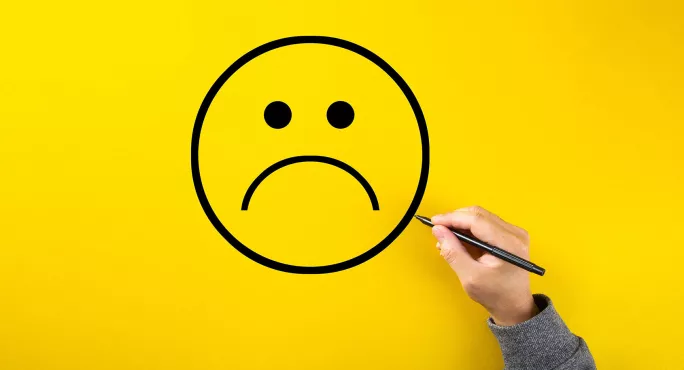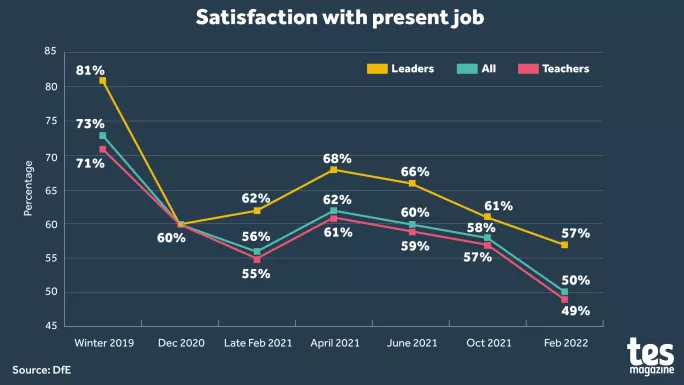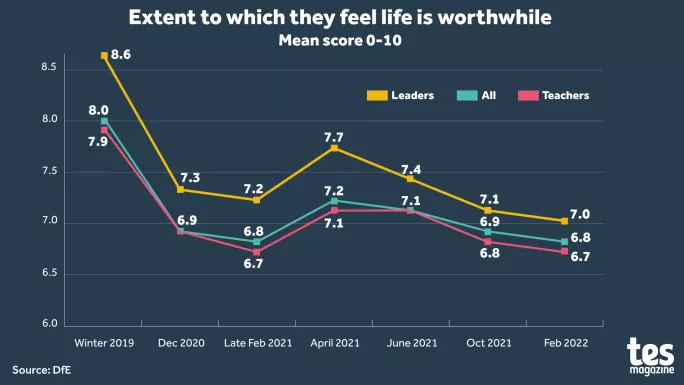Job satisfaction among heads and teachers hits new low

School leaders’ and teachers’ job satisfaction hit a new pandemic low as they struggled with soaring Covid teacher and student absence rates earlier this year, new government data shows.
Just half of the headteachers and teachers polled by the Department for Education for its School and College Panel Report in February said they were satisfied at work, compared to 62 per cent last April.
The survey also showed that school leaders’ and teachers’ happiness and satisfaction with their lives by Office of National Statistics (ONS) measures “decreased significantly” since they were last measured in October 2021.
- Related: Teacher work stress worsened during 2021 due to Covid
- Leadership: How to build a culture of kindness
- Wellbeing: 4 simple ways to improve teacher wellbeing
In February 2022, leaders and teachers gave a mean rating (on a 0-10 scale) of 5.9 for life satisfaction, compared to 6.2 in October. Meanwhile, the average rating was 6.8 for feelings of worthwhileness, down from 6.9 in the autumn and 5.7 for feelings of happiness, compared to 6.0 last year.
The DfE survey showed that school leaders’ and heads’ job satisfaction has been falling steadily over the last year, with 60 per cent reporting they were satisfied at work in June last year and 58 per cent reporting the same last October.
In February, 57 per cent of school leaders said they were satisfied with their jobs, while less than half of teachers (49 per cent) reported they were content in their roles.
By region, leaders and teachers in the North East were more likely than average to report dissatisfaction in their job (53 per cent).

Teachers’ and heads’ “happiness” levels fell sharply over the course of 2020 but improved into spring last year. However, the survey shows they dropped back to the low levels seen in the early months of the pandemic over the following months of 2021 and into early 2022.

Less than half of teachers and leaders (45 per cent) said they were happy yesterday when asked this question in the survey.
The survey was carried out when Covid infections were peaking due to the Omicron variant, but schools were required to remain open.
When asked about workforce challenges they faced, over three-quarters of survey respondents said they had to deal with a lack of available supply staff to cover teacher absences.
A total of 1,218 heads and 1,598 teachers from both secondary and primary schools took part in the survey, which the DfE has said is weighted to be nationally representative.
Most teachers say students are behind due to Covid
The vast majority of teachers reported that their pupils were at least a little behind with reading (87 per cent), writing (90 per cent) and grammar, punctuation and spelling (89 per cent) compared to where they would be if the pandemic had not happened.
Nearly three in 10 (28 per cent) said pupils were very behind in writing, grammar, punctuation and spelling. Primary teachers were more likely to report pupils were behind with English and literacy - nearly one in five (19 per cent) compared to 12 per cent of secondary teachers
Just 22 per cent of teachers said they had been able to teach all of the content that they would normally have taught by this point in the academic year. Just over half said they had taught most of the content they would normally have covered (55 per cent), while one in five (19 per cent) had taught around half of a normal syllabus covered.
The most common barriers to pupils recovering from lost learning were inconsistent pupil attendance (reported by 88 per cent of schools) and shortage of staff (reported by 84 per cent of schools).
Pupil social and emotional development
Most teachers and leaders said pupils’ social and emotional development was worse than would normally be expected for a spring term prior to the pandemic.
More teaching and support staff, both in and outside the classroom, was suggested by the majority of teachers when asked what the main type of support they would find useful to help them cope with the challenges caused by the pandemic.
A consistent and robust behaviour policy, with meaningful consequences, and more engagement and support from the senior leadership team were also suggested by teachers.
The School and College Panel consists of a group of leaders and teachers that have agreed to participate in short regular research surveys on topical education issues.
Register with Tes and you can read two free articles every month plus you'll have access to our range of award-winning newsletters.
Keep reading with our special offer!
You’ve reached your limit of free articles this month.
- Unlimited access to all Tes magazine content
- Save your favourite articles and gift them to your colleagues
- Exclusive subscriber-only stories
- Over 200,000 archived articles
- Unlimited access to all Tes magazine content
- Save your favourite articles and gift them to your colleagues
- Exclusive subscriber-only stories
- Over 200,000 archived articles
topics in this article



